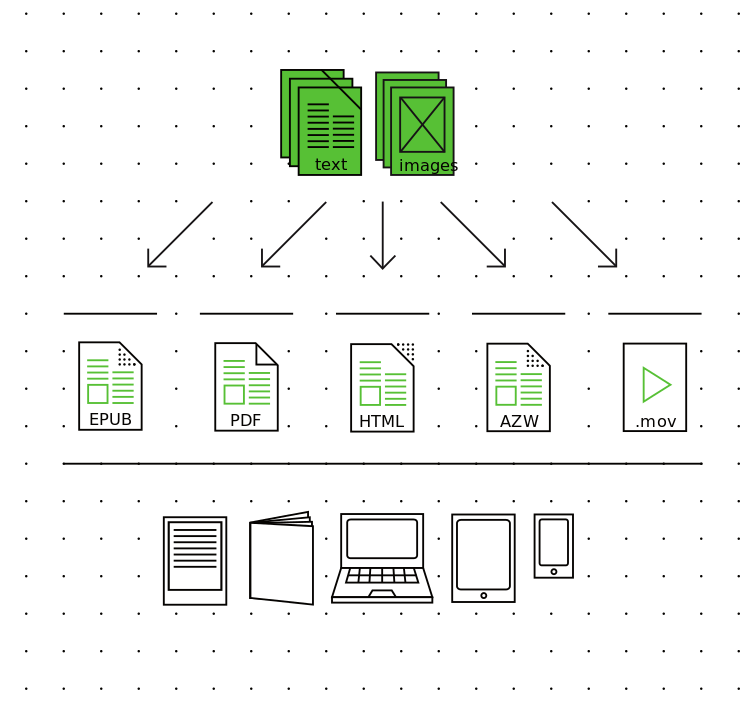Courses/Hybrid publishing
<slidy theme="a" />
practicals
- pad: http://pzwart1.wdka.hro.nl/pad/p/prof_workshop_publishing
- room: BL.00.10a
- duration: 3 hours
- date: March 8 afternoon (1.30-16.30+ drinks until 5).
- software used:
- Calibre,
- Pandoc,
- plain-text editors ( Sublime Text, Gedit )
- Base64 encoder: ( Online encoder, Convert64 (Mac OS X, commercial)
Plan
- Hybrid publishing.
- Motivations, concepts, tools, strategies, formats that have been present in hybrid publishing efforts of WdKA.
- Role and possibilities for publishing in an art school.
- Presentation publications developed to date and in-progress.
- Inauguration the device lab.
Why publishing?
- hybrid publishing as an extension of efforts from Publication station - establishing dialog between analog & digital
- continuation of Alessandro Ludovico's research on Post-Digital Print at WdKA
- continuation of Digital Publishing Toolkit project & From Print to Ebooks – a Hybrid Publishing Toolkit for the Arts
- publishing as a way to expose the research undertaken within WdKA
- publishing as a learning tool
How hybrid?
Hybrid publishing
Ludovico quote on hybrid publishing in Progetto Grafico #28
Possibilities and constraints
Plain text + poor visuals vs. rich visuals + interactivity

hybrid publishing works
Traumawien [1] [2] http://rlv.zcache.com/traumawien_button-rb0a7981400224870838ec6aaa582161c_x7j3i_8byvr_512.jpg
Badlands Unlimited http://badlandsunlimited.com/wp-content/uploads/2013/06/book_small.gif http://badlandsunlimited.com/books/phaedrus-pron/
Books Scapes, Julien Levesque, 2012
http://p-dpa.net/wp-content/uploads/2015/03/Screen-Shot-2014-02-15-at-17.17.18-600x150.png
E-Book Backup, Julien Levesque, 2012
http://p-dpa.net/wp-content/uploads/2015/03/9_ebookbackup4-300x225.jpg
Multichannel publishing workflows
- ePub
- self-contained single-file HTML e-books
- Comic book Archive
Tools for hybrid publishing
- open source, simple tools that work in combination, forming publishing pipelines
Hands-on exploration of strategies and tools
Markups
"In electronic processing of texts, this hierarchical ordering [...] as well as additional reading aids such bold or italic text, is made possible by using specific formatting codes. This process is called markup and the codes are called markup element"[1]
plain text files
Are only constituted by text. No images, no visual markings.
Are edited using plain text editors and NOT word processors.
Can displayed using the terminal cat myfile.txt will print the content of myfile.txt
Markings are done using (special characters)
Historical examples of plain text file undeground publishing
Different Markup languages
Each markup uses a different marking syntax
HTML:
<h1>Revenge of the Text</h1>
<p>There is a room in the <strong>Musée d’Orsay</strong> that I call the <em>room of possibilities</em>.</p>
<p>That room contains:</p>
<ul>
<li>a snow flake</li>
<li>the end of a cloud</li>
<li>a bit of nothing</li>
</ul>
= Revenge of the Text = There is a room in the '''Musée d’Orsay''' that I call the ''room of possibilities''. That room contains: * a snow flake * the end of a cloud * a bit of nothing
# Revenge of the Text There is a room in the **Musée d’Orsay** that I call the *room of possibilities*. That room contains: * a snow flake * the end of a cloud * a bit of nothing
p> <hi>A New yeares guift for shrews</hi> is a diminutive sheet engraved c.1630 and signed by the relatively unknown Thomas Cecill, who seems to have been active between 1625 and 1640. It bears the imprint of the even less known Edward Lee, whose only other issue is a large equestrian portrait of Charles I. </p> <p>In a series of unified scenes, it depicts the traditional nagging wife eventually beaten by her husband, and ultimately chased off by the devil. It is accompanied by the following rhyme of a traditional type, reminiscent of the ditty about <hi>Solomon Grundy</hi>, who was <hi>Born on Monday</hi>, and then on successive days christened, married, taken fatally ill and <hi>Buried on Sunday</hi>: </p> <q> <lg rend="italics"> <l>Who marieth a wife uppon a Moneday,</l> <l>If she will not be good uppon a Tewesday, </l> <l>Lett him go to the wood uppon a Wensday, </l> <l>And cutt him a cudgell uppon the Thursday, </l> <l>And pay her soundly uppon a Fryday; </l> <l>And<note><hi>And</hi>: if</note> she mend not, the Divil take her a Saterday </l> <l>Then may he eate his meate in peace on the Sonday.</l> </lg> </q>
<?xml version="1.0" encoding="UTF-8"?>
<book xml:id="simple_book" xmlns="http://docbook.org/ns/docbook" version="5.0">
<title>Very simple book</title>
<chapter xml:id="chapter_1">
<title>Chapter 1</title>
<para>Hello world!</para>
<para>I hope that your day is proceeding <emphasis>splendidly</emphasis>!</para>
</chapter>
<chapter xml:id="chapter_2">
<title>Chapter 2</title>
<para>Hello again, world!</para>
</chapter>
</book>
Reference: Petr van Blokland, Het boek als object, Items, 2004 (!)
Do
Create one plain-text file
Using either in HTML or Wiki syntax.
You can:
- write it from scratch
- copy HTML content from any website with "View Source"
- copy Wiki content from any wiki: Publication Station, Beyond Social, Wikipedia, etc
- edit its content
Save it dedicated folder.
turn this file into into other formats
Pandoc - a markup converter
If you need to convert files from one markup format into another, pandoc is your swiss-army knife
Pandoc - converting to HTML
pandoc -f markdown -s -o test.html test.txt
Pandoc - converting to ePub
pandoc -f markdown -o test.epub test.txt
converting to single-file self-contained e-book
pandoc -f markdown -s --self-contained -o test.html test.txt
- HTML - web (options: --standalone, --css, title, etc - so they get a sense of the options)
- HTLM - self-contained mulimedia e-books based on single HTML files
- EPUB (options: --epub-stylesheet, --epub-cover, --epub-chapter-level)
Epub An editable format
Calibre's edit book function to
- open an epub
- navigate structure
- change content, style, metadata
- the issue of good reader apps
Self-contained HTML
- Example of a multimedia e-zine with animated GIFs and sound
- Look at the source code
- What is a data URI?
- What can you do better with self-contained HTML, what can you do better EPUB?
converting to PDF
A complicated case.
Different approaches tried:
- Research on ICML & inDesign
- Pandoc via LaTeX/XeTeX
- Weasyprint(HTML + CSS) Research on Weasyprint


